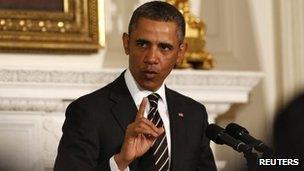Sequester: Obama urges governors to prod Congress to deal
- Published

Obama called for "just a little bit of compromise" to head off the deep budget cuts
President Barack Obama has urged US governors to prod Congress to strike a budget deal averting a raft of deep budget cuts set to hit on Friday.
He warned the $85bn (£56bn) cuts would put thousands of teachers out of work and bring economic uncertainty.
The president has called on Congress to pass revenue rises and some budget cuts to avoid the automatic reductions.
The Democratic president will travel to Virginia on Tuesday to discuss the cuts' impact on the defence industry.
"These cuts do not have to happen," Mr Obama told a bipartisan assembly of governors at the White House on Monday. "Congress can turn them off any time with just a little bit of compromise."
Unless Congress acts, the automatic cuts are set to take effect on Friday, part of a total $1.2tn in reductions over 10 years.
Republicans say they will not agree to a deal that includes a tax rise.
The budget cuts, known in Washington DC as the sequester, were devised in 2011 as an intentionally painful cudgel to encourage Democrats and Republicans in Congress to strike a deal to reduce the US budget deficit.
Now, House Republicans say reduced spending should be the focus of any deal, while Mr Obama and the Democrats want a package to include new tax revenue by closing tax loopholes for wealthy Americans.
With no deal in sight, on Sunday the Obama administration released fact sheets highlighting the threatened economic impact of the automatic cuts on a state-by-state basis.
"These impacts will not all be felt on day one," Mr Obama told the governors on Monday, "but the uncertainty is already having an effect.
"Companies are preparing layoff notices. Families are preparing to cut back on expenses. And the longer these cuts are in place, the bigger the impact will become."
The White House has warned of job losses for teachers, more expensive meat prices as inspectors are furloughed, air travel delays, and complications in distributing vaccines for children.
"While you are in town, I hope you speak with your congressional delegation," Mr Obama told the governors. "And remind them in no uncertain terms exactly what is at stake and exactly who is at risk."
The defence department has said it will make redundant up to 46,000 temporary workers and cause employees to lose one day of work per week without pay from April, saving $5bn.
In a separate press conference on Monday, homeland security secretary Janet Napolitano said queues at airport security checkpoints and at border crossings would lengthen considerably if the cuts were put into place.
Meanwhile, Republicans and Democrats are each trying to make sure the public blames the other side, should the automatic cuts take effect.
Senator John McCain, the 2008 Republican presidential nominee, called the looming defence cuts "unconscionable" and urged Mr Obama to call lawmakers to the White House to work out a deal.
"I won't put all the blame all on the president of the United States," Sen McCain told CNN. "But the president leads."
Maryland Governor Martin O'Malley, a Democrat, said the cuts were "senseless".
"This really threatens to hurt a lot of families in our state and kind of flat-line our job growth for the next several months," he said.